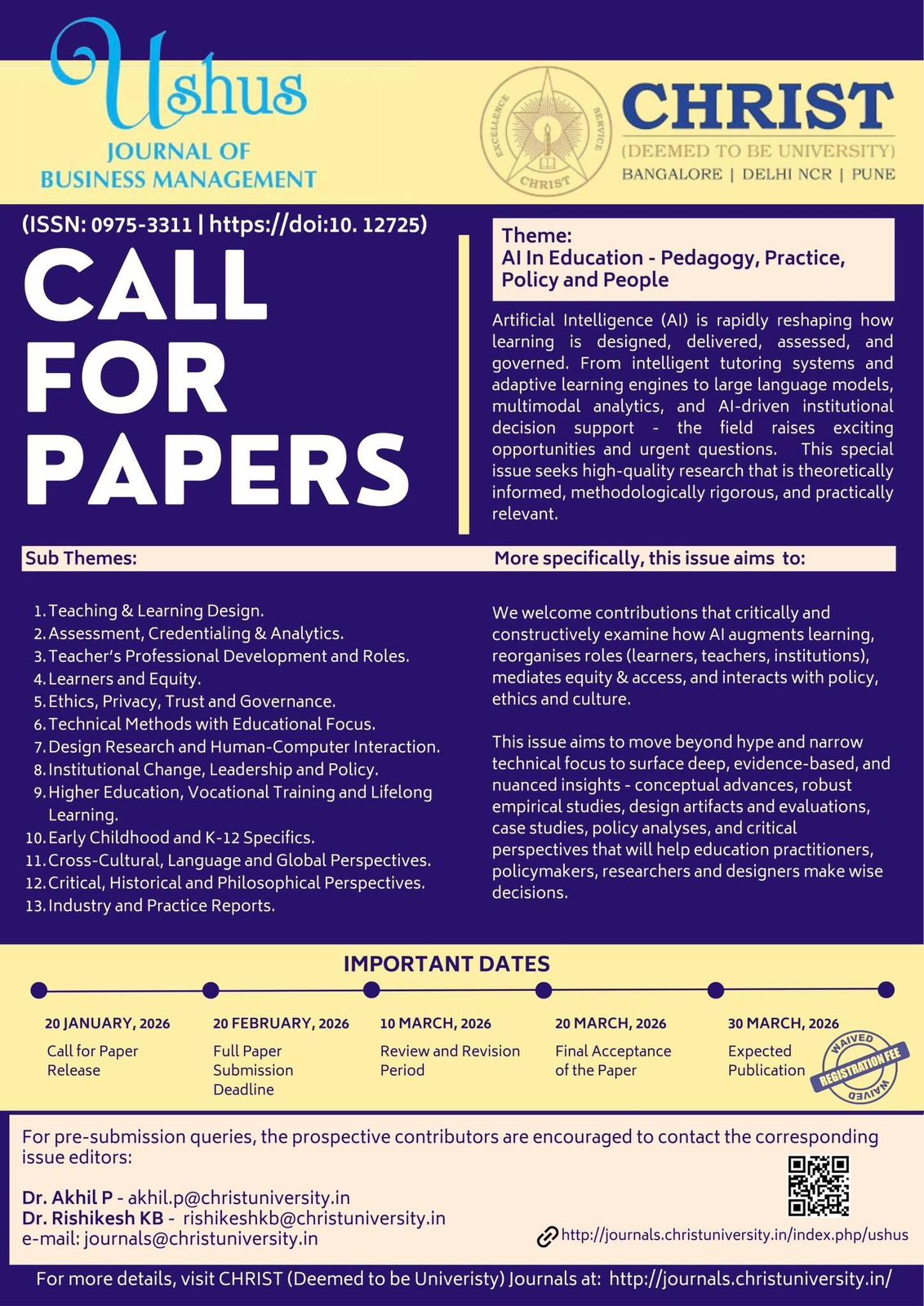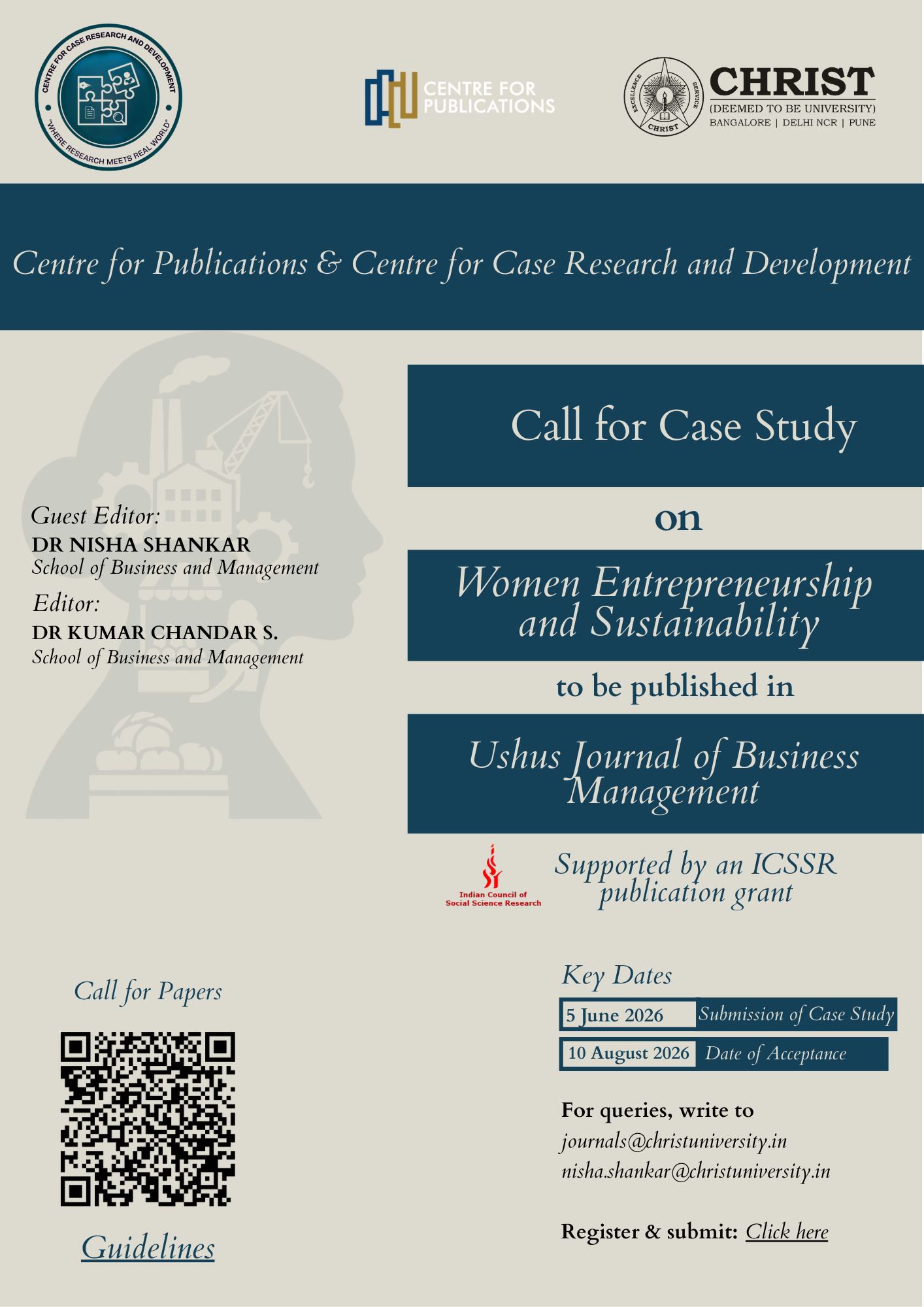Sustainability in Industry 4.0
DOI:
https://doi.org/10.12725/ujbm.60.3Keywords:
Industry 4.0, Revolution, Sustainability, Green Labour, DigitizationAbstract
Industry 4.0 is considered the fourth industrial revolution. It is becoming a cutting-edge research topic among Academicians, industrialists, politicians and scientists. Researchers are focussing on the relationship between sustainability and industry 4.0 nowadays. The first part of this chapter will discuss how industry 4.0 can achieve sustainable development. The next part of this chapter concerns how green Labour markets can be digitised in industry 4.0. The smart technology of industry 4.0 helps in optimum utilisation of resources and reduction of waste. The social implication of industry 4.0 includes Employment generation and skill development. The main sustainability drivers of industry 4.0 are economic, environmental and social benefits. Transformation of industry 4.0 aimed towards achieving sustainable development, which is the need of the hour currently due to scarcity of resources. However, this transformation of industry 4.0 is a complicated and gradual process.
References
Bag, S., Telukdarie, A., Pretorius, J. H. C., & Gupta, S., (2018). Industry 4.0 and supply chain sustainability: framework and future research directions. Benchmark: Int. J. https://doi.org/10.1108/BIJ-03-2018-0056.
Beier, G., Ullrich, A., Niehoff, S., Reißig, M., & Habich, M., (2020). Industry 4.0: how it is defined from a sociotechnical perspective and how much sustainability it includes a literature review. J. Clean. Prod. 259. https://doi.org/10.1016/j.jclepro.2020.120856.
Birkel, H. S., & Müller, J. M., (2020). Potentials of industry 4.0 for supply chain management within the triple bottom line of sustainability–A systematic literature review. J. Clean. Prod. 289, 125612. https://doi.org/10.1016/j.jclepro.2020.125612.
Bordeleau, F. E., Mosconi, E., & de Santa-Eulalia, L. A., (2020). Business intelligence and analytics value creation in Industry 4.0: a multiple case study in manufacturing medium enterprises. Prod. Plann. Contr. 31 (2-3), 173-185. https://doi.org/10.1080/09537287.2019.1631458
Brundtland, (1987). Report of the world commission on environment and development: our common future. https://sustainabledevelopment.un.org/content/documents/5987our-common-future.pdf.
Castelo-Branco, I., Cruz-Jesus, F., & Oliveira, T., (2019). Assessing industry 4.0 readiness in manufacturing: evidence for the European union. Comput. Ind.107, 22-32. https://doi.org/10.1016/j.compind.2019.01.007.
Cheng, Y., Awan, U., Ahmad, S., & Tan, Z., (2021). How do technological innovation and fiscal decentralization affect the environment? A story of the fourth industrial revolution and sustainable growth. Technol. Forecast. Soc. Change, 162, 120398.
Culot, G., Nassimbeni, G., Orzes, G., & Sartor, M., (2020). Behind the definition of Industry 4.0: analysis and open questions. Int. J. Prod. Econ., 226 https://doi.org/10.1016/j.ijpe.2020.107617.
Farrell, L., Newman, T., & Corbel, C., (2020). Literacy and the workplace revolution: a social view of literate work practices in Industry 4.0. Discourse: Studies in the Cultural Politics of Education, 1-15.
Fatimah, Y. A., Govindan, K., Murniningsih, R., & Setiawan, A., (2020). Industry 4.0 based sustainable circular economy approach for smart waste management system to achieve sustainable development goals: a case study of Indonesia. J. Clean. Prod., 269, 122263.
Ghobakhloo, M., Fathi, M., Iranmanesh, M., Maroufkhani, P., & Morales, M. E. (2021). Industry 4.0 ten years on: A bibliometric and systematic review of concepts, sustainability value drivers, and success determinants. Journal of Cleaner Production, 127052.
Jena, M. C., Mishra, S. K., Moharana, H. S., (2020). Application of Industry 4.0 to enhance sustainable manufacturing. Environ. Prog. Sustain. Energy, 39 (1), 13360.
Kamble, S., Gunasekaran, A., & Dhone, N. C., 2020. Industry 4.0 and lean manufacturing practices for sustainable organisational performance in Indian manufacturing companies. Int. J. Prod. Res., 58 (5), 1319-1337
Kamble, S. S., Gunasekaran, & A., Gawankar, S. A., 2018a. Sustainable Industry 4.0 framework: a systematic literature review identifying the current trends and future perspectives. Process Saf. Environ. Protect., 117, 408-425. https://doi.org/10.1016/j.psep.2018.05.009.
Kerin, M., & Pham, D.T., 2019. A review of emerging industry 4.0 technologies in remanufacturing. J. Clean. Prod., 237. https://doi.org/10.1016/j.jclepro.2019.117805.
Kraeger, P., Pospíšil, M., Howard, D. B., Freise, M., Sacco, J., & Chan, K. (2010). Heinrich Böll Stiftung, in: International Encyclopedia Civic Sociology. .
Neal, A. D., Sharpe, R. G., Conway, P. P., West, A. A., 2019. smaRTIda cyber-physical intelligent container for industry 4.0 manufacturing. J. Manuf. Syst., 52, 63-75. https://doi.org/10.1016/j.jmsy.2019.04.011 Perechuda, K., & Sobińska, M. (2014, September). Challenges for knowledge management in the context of it global sourcing models implementation. In IFIP International Workshop on Artificial Intelligence for Knowledge Management (58-74). Springer, Cham. Piątek, Z. (2017). Czym jest przemysł 4.0. Część I, pozyskano z: http://przemysl-40. pl/(dostęp: 15.11. 2019).
Roblek, V., Meško, M., & Krapež, A. (2016). A Complex View of Industry 4.0. SAGE Open.
Rosa, P., Sassanelli, C., Urbinati, A., Chiaroni, & D., Terzi, S., 2020. Assessing relations between Circular Economy and Industry 4.0: a systematic literature review. Int. J. Prod. Res., 58 (6), 1662-1687. https://doi.org/10.1080/00207543.2019.1680896.
Rutkowska, M., & Sulich, A. (2020). Green Jobs on the background of Industry 4.0. Procedia Computer Science, 176, 1231-1240. Rutkowska-Podołowska, M. (2016). Zielonemiejscapracyjakoecoinnowacja. ZeszytNaukowy. pl/WyższaSzkołaZarządzaniaiBankowości w Krakowie, 39, 151-161. Sanders, A., Elangeswaran, C., & Wulfsberg, J. P. (2016). Industry 4.0 implies lean manufacturing: Research activities in industry 4.0 function as enablers for lean manufacturing. Journal of Industrial Engineering and Management (JIEM), 9(3), 811-833.
Stock, T., Obenaus, M., Kunz, S., & Kohl, H., (2018). Industry 4.0 as enabler for a sustainable development: a qualitative assessment of its ecological and social potential. Process Saf. Environ. Protect., 118, 254-267.
Yadav, G., Kumar, A., Luthra, S., Garza-Reyes, J.A., Kumar, V., & Batista, L., (2020). A framework to achieve sustainability in manufacturing organisations of developing economies using industry 4.0 technologies’ enablers. Comput. Ind., 122, 103280.
Downloads
Published
How to Cite
Issue
Section
License
Copyright (c) 2022 Sapna Jangra, Anjali Gupta

This work is licensed under a Creative Commons Attribution-NonCommercial-NoDerivatives 4.0 International License.



